Olfaction or the sense of smell is perhaps the most crucial human senses that can influence our cognition, emotion, attitude, and behavior.
Olfaction: The sense of smell
Our sense of smell is often considered to be one of the most mysterious out of our five senses. Smell has played a vital role in ensuring our survival throughout our evolution. It is only through our ability to differentiate thousands of unique scents and odors we are able to identify a threat and realize when we are safe.
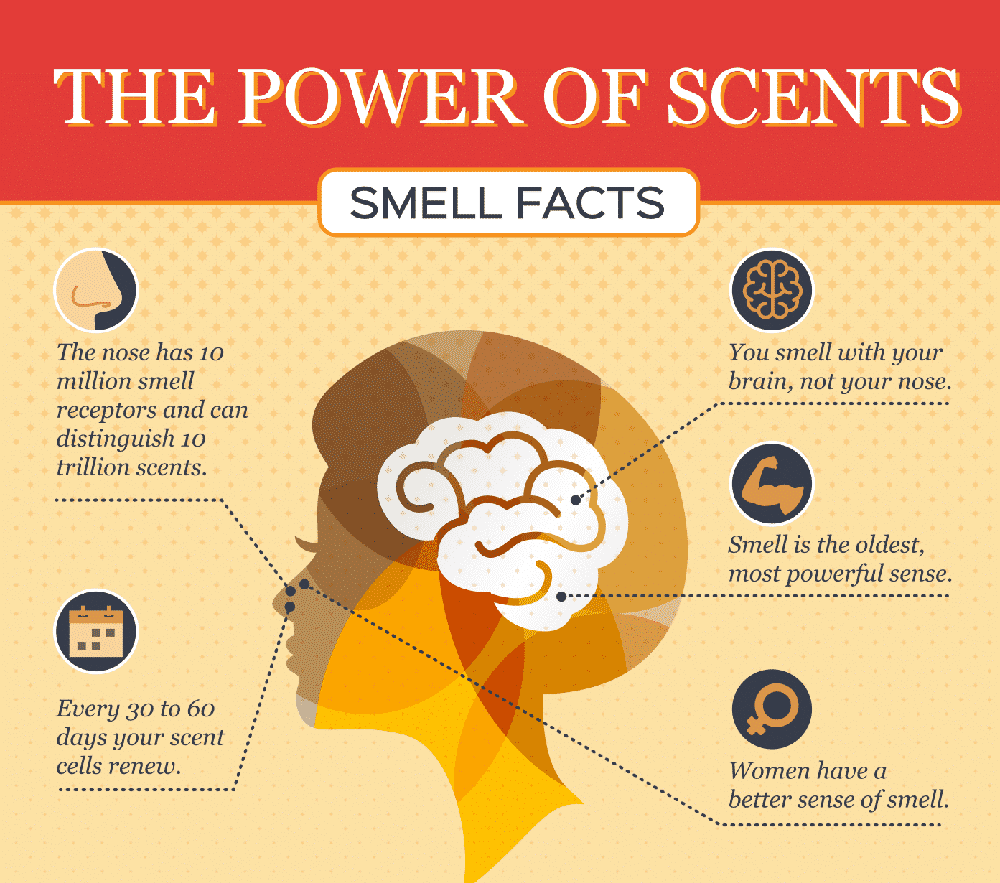
Guinness World Record holder, endurance athlete and author Christopher Bergland writes “Smell is often the first warning of safety or danger, friend or foe. Smells have the power to drive your behavior on an instinctive and subconscious level. Luckily, you can also harness the power of smell and consciously use it to your advantage.”
Unfortunately, most of us tend to underestimate the importance of smell. Olfaction is a physical sensation that can regulate our mental experiences. It can evoke psychological states of mind, both negative and positive, and trigger instantaneous reflexes. It can subtly influence our thoughts and emotions even when we are not aware of the scents in our present environment.
Read also: Dogs Can Sense Bad People according to science
Why smell is so important
According to Fifth Sense, a charity for individuals affected by olfactory disorders, our olfactory neurons generate an impulse when it detects a smell. The olfactory nerve passes the impulse to a part of the brain known as the olfactory bulb. Here the signal is processed and passed on to related areas of the brain. This is collectively called the limbic system.
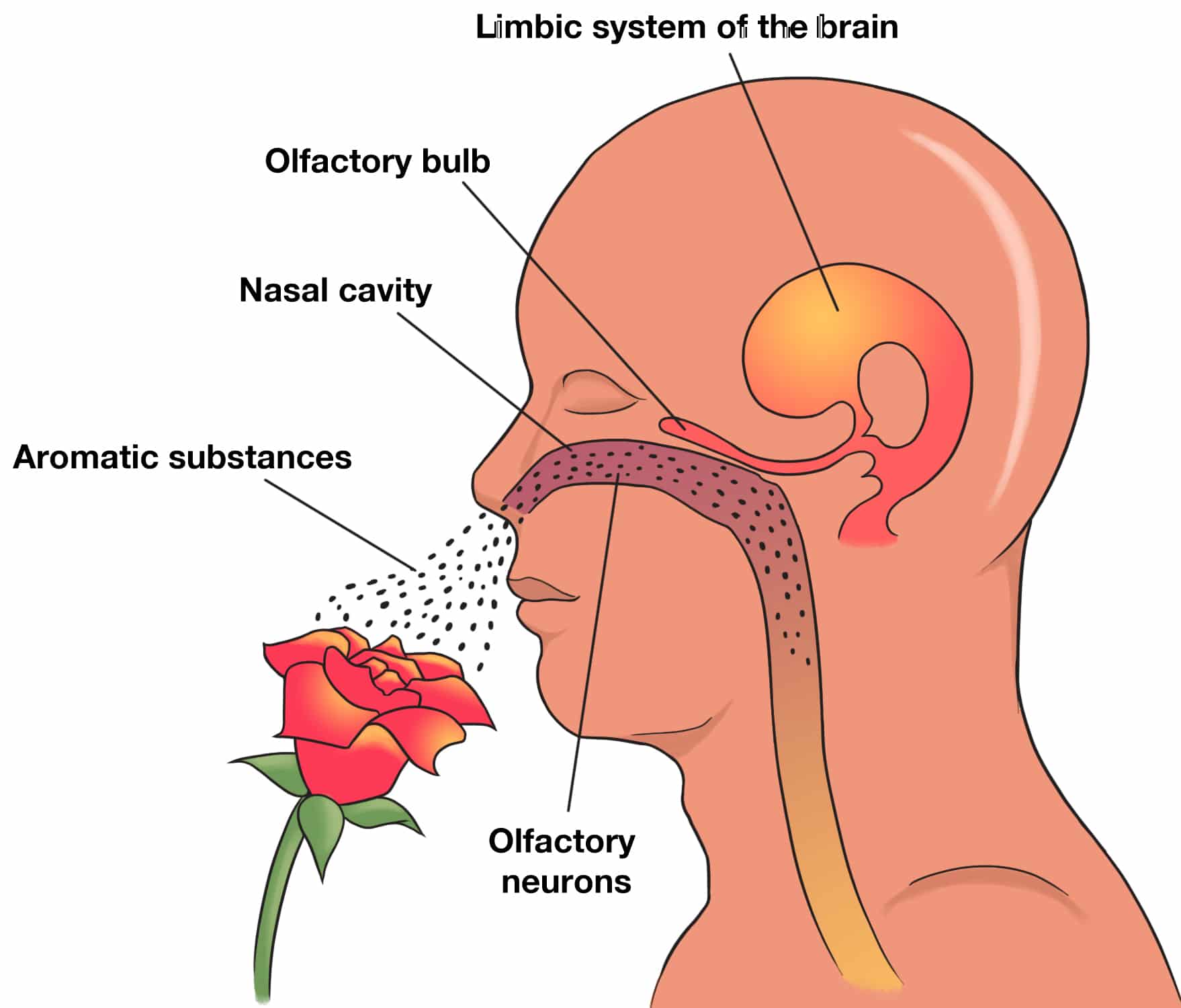
The Fifth Sense explains that “The limbic system comprises a set of structures within the brain that are regarded by scientists as playing a major role in controlling mood, memory, behaviour and emotion.” The Khan Academy adds that “The limbic system is a set of structures in the brain that deal with emotions and memory.” This helps us to realize why smell is so important when it comes to managing our mood, memories and emotions.
Scents and psychology
Our sense of smell is an evolutionary tool and all creatures from single-celled bacteria to bloodhounds can identify chemicals around them. The American Psychological Association (APA) explains “Odors are molecules, after all, and olfaction is just the vertebrate version of chemical sensing.”
But can smell affect our mood and behavior? Rachel S. Herz, an assistant professor of psychology at Brown University and author of The Scent of Desire: Discovering Our Enigmatic Sense of Smell believes the answer is yes. She explains “Odors do affect people’s mood, work performance and behavior in a variety of ways but it isn’t because odors work on us like a drug, instead we work on them through our experiences with them.” An odor can create a response only when we have associated a past event with that smell first. This process is called associative learning, where one event is linked to another due to past experiences. Once the association is established, the linked event can generate a conditioned response in response to the original event.
Read also: 35+ Mind Bending Psychology Facts About Human Behavior

Rachel adds “We know that the neurological substrates of olfaction are especially geared for associative learning and emotional processing. The olfactory bulbs are part of the limbic system and directly connect with limbic structures that process emotion (the amygdala) and associative learning (the hippocampus).” Due to this neurological reason, olfaction and odors can influence our emotions and mood.
A 2016 study revealed a significant role for olfactory stimulation in the alteration of cognition, mood, and social behavior. It found that fragrances such as perfumes and room fresheners can influence our psychophysiological activities. The study states “The sense of smell plays an important role in the physiological effects of mood, stress, and working capacity.” It adds “Fragrances directly and/or indirectly affect the psychological and physiological conditions of humans.”
How smell affects our mood
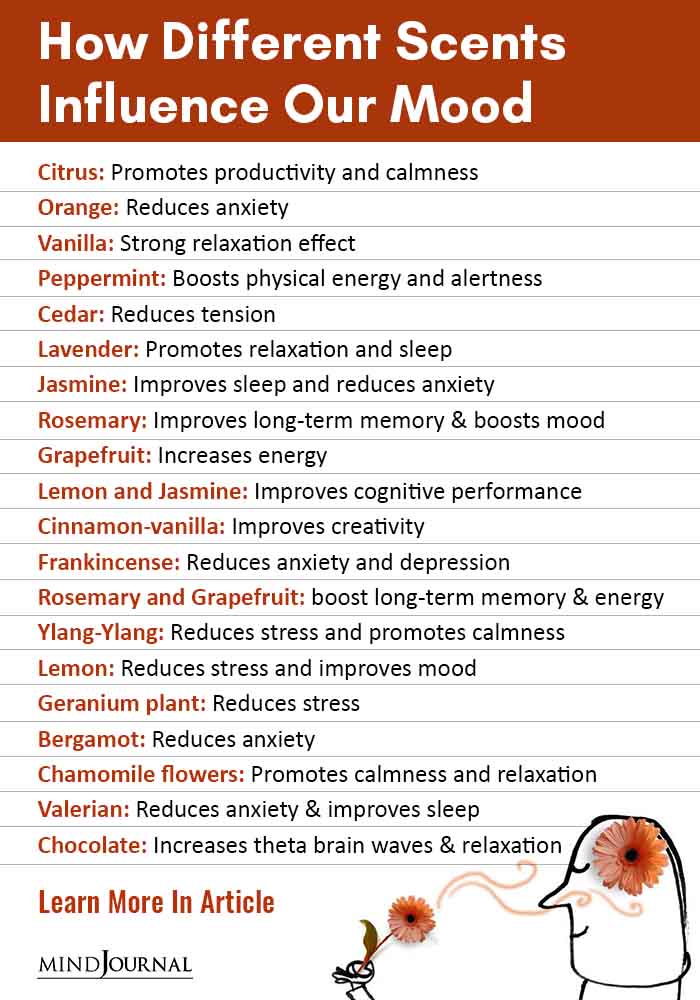
Our memories are stored in the part of the brain which processes scents and odors. Hence, scents can not only trigger our memories, but also influence our emotions, cognitive abilities and productivity as well. “Odour molecules flow to the limbic system in the brain, where feelings, moods, emotions, sexual behaviour and memory are processed,” says Karen Gilbert, perfumery expert and author of The Art and Craft of Fragrance.
Here’s our scents and our sense of smell affects our mood and behavior:
1. Olfaction and memory
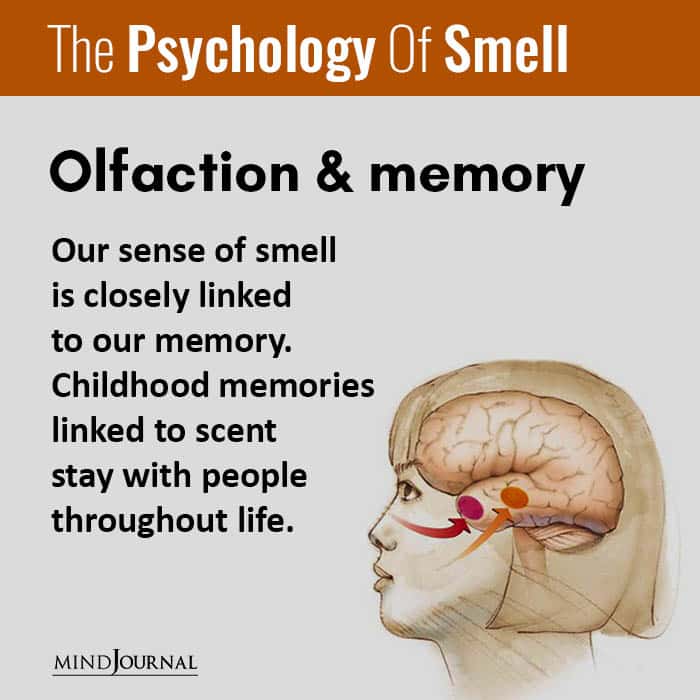
Our sense of smell or olfaction is closely linked to our memory, perhaps more than any other human senses due to the unique anatomy of our brain, believes Harvard’s Venkatesh Murthy, a Raymond Leo Erikson Life Sciences Professor of Molecular and Cellular Biology. Certain scents can even evoke memories from childhood. “This can often happen spontaneously, with a smell acting as a trigger in recalling a long-forgotten event or experience,” explains the Fifth Sense. French novelist Marcel Proust in his book Remembrance of Things Past talks about how scents are often associated with early life experiences that are stored in our memory. This is known as the Proustian memory effect. “Childhood memories linked to scent stay with people throughout life,” explains Christopher Bergland.
Read also: What Type Of Memory Do You Have? – Psychological Test
Scents are very important and special as “they can bring back memories that might otherwise never be recalled,” says Herz. She adds “If there’s a smell that’s connected to something that happened way in your past and you never run into that smell again, you may never remember what that thing was. And this is unlike any of our other sensory experiences.”
2. Olfaction and emotion
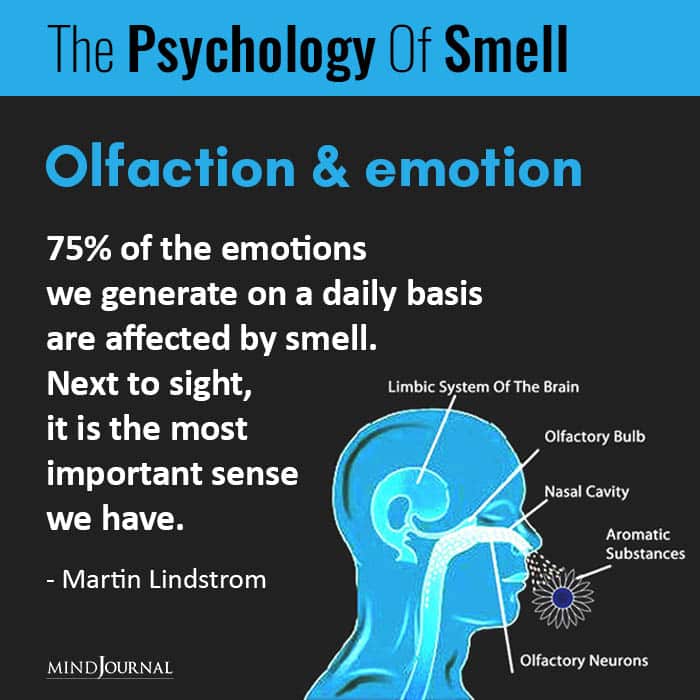
Scents can be very emotive and may stimulate strong emotional reactions. According to the Social Issues Research Centre (SIRC) “The perception of smell consists not only of the sensation of the odors themselves but of the experiences and emotions associated with these sensations.” Research shows that most of our preference of and aversion towards scents are primarily based on emotional associations. As mentioned earlier, our olfactory receptors are linked with the limbic system which regulates our emotions. So when a scent stimulates our brain and activates our limbic system, deep-rooted emotional responses are triggered.
Smell also plays a crucial role in romantic attraction as body odors can make us like or dislike someone. Infact, research at Chicago University found that we prefer smells of individuals with better genetic material related to immunity. According to the Fifth Sense, “Research has shown that our body odour, produced by the genes which make up our immune system, can help us subconsciously choose our partners.”
Moreover, a 2013 study found that there is a strong relationship between our sense of smell and emotions. The study states “Phylogenetically the most ancient sense, olfaction is characterized by a unique intimacy with the emotion system.” Unfortunately, certain scents and olfaction can also strongly trigger negative emotions, especially in people suffering from posttraumatic stress disorder (PTSD), explains Jordan Gaines Lewis, Ph.D., postdoctoral researcher at Penn State College of Medicine.
Read also: How to Improve Mental and Emotional Health
3. Olfaction and creativity

Our sense of smell can even influence our cognitive abilities and our creativity. By influencing our memories and emotions, scents tend to regulate our moods (how we think) and behavior (how we act). And our mood plays a crucial role when it comes to being creative.
In a Scientific American article, psychologist and cognitive neuroscientist Rachel Herz explains “In terms of cognition, mood has been shown to influence creativity with the typical finding that people in a positive mood exhibit higher levels of creativity than individuals in a bad mood. Odors can also produce the same effects.” She adds “When people were exposed to an odor they liked creative problem solving was better than it was when they were exposed to an unpleasant odor condition.” Environmental psychologist Sally Augustin, Ph.D. believes that different types of smell can trigger different psychological reactions. She believes that the scent of vanilla and cinnamon can actually help to improve our creativity.
Read also: How Reading Science Fiction Can Build Resilience In Kids
4. Olfaction and performance
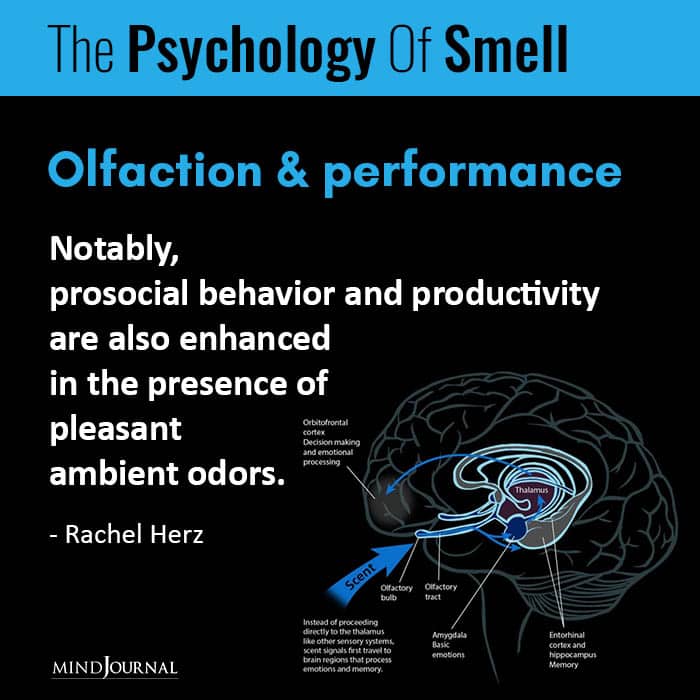
Smell can also influence our performance and determine our productivity. A positive mood increases our productivity and a negative mood decreases prosocial behavior. It has been observed that pleasant ambient odors can also help to improve productivity and prosocial behavior.
Herz writes “People who worked in the presence of a pleasant smelling air freshener also reported higher self-efficacy, set higher goals and were more likely to employ efficient work strategies than participants who worked in a no-odor condition.” On the other hand, it has been found that malodor in the work environment can reduce our subjective judgments and decrease our tolerance for frustration.
Read also: 10 Ways To Develop Logical Thinking Skills
5. Olfaction and relaxation
According to a 2005 study, specific scents can effectively influence our mood and make us feel relaxed by invoking a muscle-relaxing effect. The study found that certain odors and fragrances can help to reduce stress. This is where Aromatherapy comes in. Wellness coach Elizabeth Scott, MS explains “Aromatherapy has been shown to carry many benefits in terms of wellness and stress relief.” She adds “Studies have shown that aromatherapy does indeed have an effect on brainwaves and can alter behavior.”
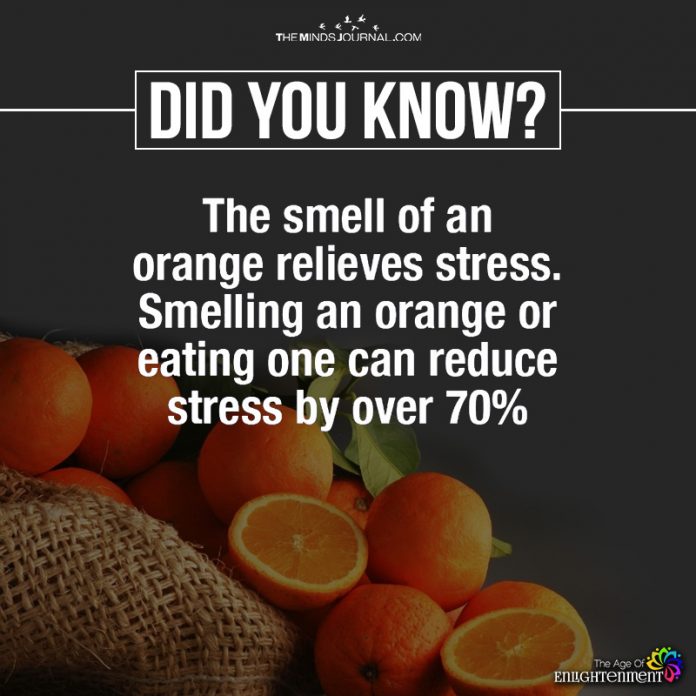
According to a 2016 study, rose water aromatherapy can help to significantly reduce anxiety. The study found that “rose water noticeably reduces anxiety” and it can improve our “emotional and spiritual condition,” as well. Another 2013 study found that “lavender oil may be an effective medicament in treatment of several neurological disorders. Several animal and human investigations suggest anxiolytic, mood stabilizer, sedative, analgesic, and anti-convulsive and neuroprotective properties for lavender.”
Read also: 15 Ways to Naturally Reduce Anxiety
How to use scents to improve your mood
Now that you know how scents and olfaction can impact your mood, behavior and wellbeing, it is important that you learn how you can use your sense of smell to your advantage. You can use scents to invoke certain memories, and also use them to feel a certain way and feel more creative and relaxed as well.
Here’s how some scents and odors can help you set your mood:
- Citrus scents helps you feel more awake, active and calmer
- Orange scents helps to reduce anxiety
- Vanilla scents have a strong relaxation effect. It improves blood pressure and stabilizes heart rates.
- Peppermint scents improve muscular performance and are physically energising. It also increases memory and alertness
- Cedar scents helps to reduce tension
- Lavender scents are a natural relaxation and sleep aid. It improves cognitive performance & has other mild sedative and calming effects.
- Jasmine improves the quality of sleep and reduces anxiety after waking up
- Rosemary scents help in improving long-term memory. It also boosts mood, performance & feelings of contentment
- Grapefruit scents are very energizing.
- Lemon and Jasmine scents are known to improve thinking and cognitive performance
- Cinnamon-vanilla scents are excellent for improving creativity
- Burning Frankincense helps to reduce anxiety and depression
- Rosemary and Grapefruit scents increase energy & boost long-term memory
- Ylang-Ylang is good for de-stressing and has a strong calming effect
- Lemon scents are good for stress relief and mood enhancement. It has antidepressant effects.
- Geranium plant scents help to relieve stress
- Bergamot, a fragrant citrus fruit, can help to relieve anxiety
- Chamomile flowers promote calmness and relaxation
- Valerian scents are popular for its anxiety-reducing effects. It also helps with improving sleep quality
- Smell of Chocolate increases theta brain waves, which triggers relaxation
Read also: 25 Interesting Psychology Facts That Will Blow Your Mind
Awaken your olfactory senses
“Smell is a potent wizard that transports you across thousands of miles and all the years you have lived.” – Helen Keller
Smell can influence our mood, behavior, memory, attraction, stress, performance, sleep and many more. The fact is, our overall well being is greatly dependent on the health of our sense of smell. “Recognizing the power of specific smells in your day-to-day life gives you the ability to use fragrance as a tool to create a psychological state of mind on demand,” says Christopher Bergland. So if you want to gain better control over your mood and behavior, then focus more on the power of olfaction.
Rachel Herz concludes “The next time you smell a scent that you like, see if you can figure out where you first experienced it and then also reflect to yourself whether you feel any mood change and if that mood makes you want to do anything in particular.”
Read also: Priming Psychology: How To Influence Someone’s Thoughts and Behaviors
Here is an interesting video that you may find helpful:







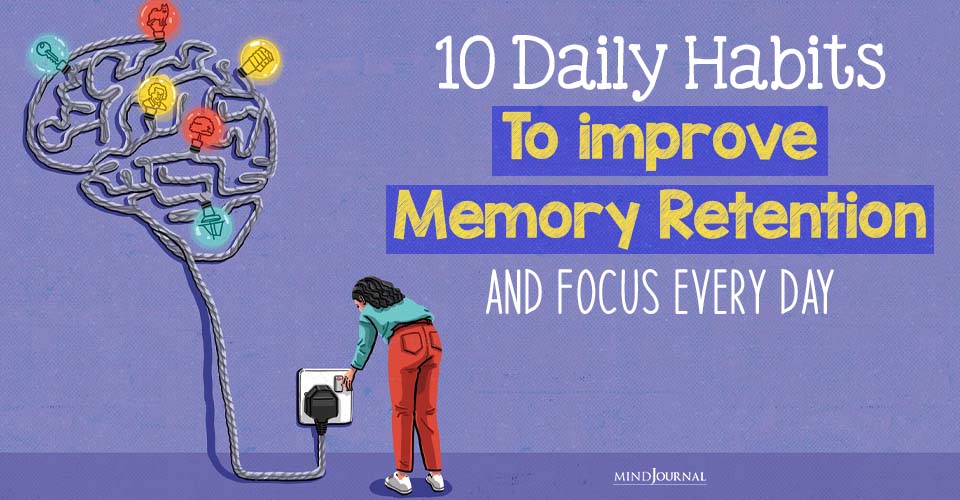


Leave a Reply